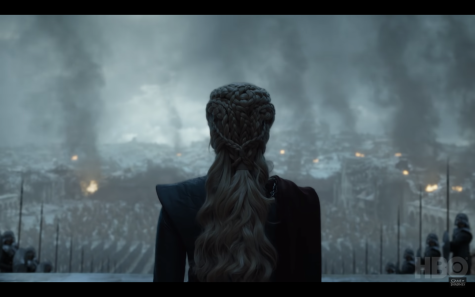Our watch is over: a “Game of Thrones” retrospective
June 5, 2019
How do you end one of the most-watched television shows ever put to screen? “Game of Thrones” writers D.B. Weiss and David Benioff put forth their answer to that question with “The Iron Throne,” the final episode of a worldwide phenomenon that has been running on HBO for nearly a decade.

The irony of the title “The Iron Throne” hits viewers once Drogon, the last surviving dragon, destroys the throne after Daenerys is killed to prevent another Targaryen dictatorship. “When you play the game of thrones, you win, or you die,” said Cersei Lannister in the show’s first episode. By melting the throne, Drogon ended the game of thrones, and thus the vicious cycle of wars fought over it.
The destruction of the throne fits into the episode’s larger theme of new beginnings. After Daenerys is killed and Westeros is left without a leader, Lord Tyrion Lannister convinces the lords of Westeros that their new leader should be decided by the lords themselves rather than by succession, as has been the norm in the history of the show. Thus, we have our new king, Bran the Broken. In his appointment to the throne, the Westeros we have learned about over the previous eight seasons get a new status quo, hinting at a better future to come.
We also get to see each of the Stark children get a fresh start. Sansa assumes the title of Queen of the North, while Jon, now with his season one hair, ventures off with the Wildlings and Arya sets sail for west of Westeros. In this way, “Game of Thrones” ends the way it began; with the Stark children going their separate ways. By doing this, Benioff and Weiss suggest that this final episode is not the end of these characters’ journeys.
In this sense, the approach Benioff and Weiss take to this final episode is different from most other shows. Rather than trying to recapitulate eight seasons of storylines in a single episode, they send off our characters to live on in a world that feels both familiar and new at the same time.
However, not all of the finale is treated with such care. Most egregious was the introduction of an in-world historical record of the events of the show entitled “A Song of Ice and Fire,” which was so tacky that the Grand Maester Samwell Tarly might as well have winked into the camera while presenting the book.
Beyond corny references, the finale’s other flaws, like how it handles Grey Worm’s ending and its awkward pacing, are representative of the flaws that have plagued “Game of Thrones” in its three most recent seasons. To begin with, Grey Worm is relegated to nothing more than a bitter executioner for Daenerys in his final episode. His evil turn is even more sudden than Daenerys’s and does not give Grey Worm the ending he deserved.
In regards to to the show’s pacing, it seems that ever since Jon Snow “died” at the end of season five, “Game of Thrones” has been barrelling toward a predetermined ending. Its shift from an intellectual drama to more of an action-adventure blockbuster is evident in Jon and Daenerys’s romantic relationship, which, like many of the show’s later developments, lacked believability and seemed to exist solely to push the writers’ agendas of eliminating them both from being in line to the Iron Throne.
In contrast, in seasons one through five, the show captured the essence of human nature, exposing both its beauty and its monstrosity by showing how every small decision leads to an increasingly bigger one until eventually, it makes the difference between life or death. Viewers were surprised at every turn. From the death of Ned Stark to the birth of Daenerys’s dragons to the Red Wedding, Benioff and Weiss managed to successively subvert the audience’s expectations of what a fantasy show should and could be.
What the later seasons lacked were these seeds that were planted from the beginning. Plot points were thrown together more sloppily and viewers weren’t offered the opportunity to look back and see the path of the cause and the effect.
When “Game of Thrones” began, what set it apart from other shows was its mastery of realistic character development regardless of its setting in a fantastical world. The show achieved this with slow pacing that prioritized political power dynamics before magic and fantasy. The fantasy was welcome when it came, but what made it special was that it was not the main attraction.
Despite its flaws, “Game of Thrones” has been one of the most ambitious projects in film and television history. HBO turned a niche series of fantasy books into a television series watched all over the world. The sudden manner in which “Game of Thrones” charged into its ending will always leave many fans wondering what was left unexplored. However, what we did explore was a world of complex characters in a fantasy universe that changed the scope of television forever.




